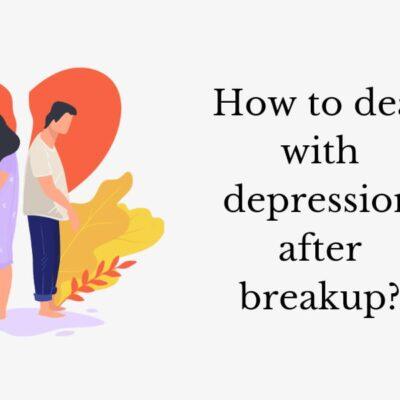How to deal with depression after a breakup: Breakups are hard, especially when they come as a surprise. It is genuine to go through a lot of heartbreaking emotions. You may even feel physical symptoms like headaches or chest pain but these emotions should decrease over time. If they don’t, there are chances that you might be suffering from depression.
You do not have to suffer from your breakup alone. If your mood never lifts or if it gets in the way of your daily life, then you need to talk to your doctor. Concurrently, you can find the right treatment to help you move on.
Why break up are hard to handle?
Romantic love act like a drug for many people. It releases the feel-good chemicals in your brain. Losing such feelings in a breakup can cause emotional and bodily problems, like stress and fatigue.
Feeling emotionally low also increases stress hormones that in some cases can make you feel like you are having a heart attack. That is called broken heart syndrome.
Some other common symptoms after a breakup include:
- Feeling lonely
- Sorrow
- Crankiness
- A shift in hunger desire
- Sleep trouble
A breakup causes more distress in certain situations. That includes:
- While you are not expecting it
- You were highly committed to the relationship
- You guys were living together
- You feel abandoned or backstabbed
Also Read: How to heal depression naturally?
How to know if I am depressed?
It is ordinary to feel bad for a while after a breakup. But significant depressive disorder, or clinical depression, is other than normal sadness. It is steady, lasts at least 2 weeks, and affects all aspects of your life. Stressful life events, like separation, can trigger depression. But it is likely to have depression-like symptoms without having a mood disorder. It is necessary to know what symptoms look it.
If you have clinical depression, you might have several of the following:
- Constant unhappiness or worry
- Feeling empty
- Irritability
- Fatigue
- General feelings of regret
- No expectancy for the future
- Least interested in things you used to love
- Desire changes
- Sleep disorder
- Unable to make proper decisions
- Slow-moving or talking
- Headache or body aches
- Stomach pains
- Thoughts of death or suicide
The following are the risk factors involved:
Many people do not feel depressed after a breakup. But it is more likely to happen in certain situations. That includes:
You have a history of depression
You are more likely to have another depressive outbreak if you have had one in the past.
Overuse drugs and alcohol
Usage of such substances can mask a hidden mood disorder or it may make depression worse.
You have an adjustment disorder
There is a condition where you have a very strong reaction to stress or unexpected change. Your symptoms might take 4-6 months to go away. In some cases, it might take longer.
You don’t have social support
If you’re depressed, you might want to stay away from your friends and family. On the other side, loneliness can worsen your sadness.
How to deal with depression after a breakup?
It might take some time, but there are a few steps you can take to get through your breakup. We all are different, so what helps someone else might not work for you. The crucial thing is that you take care of yourself along the way.
Here are some healthy ways to deal with depression after a breakup:
Avoid talking to your ex
This is not possible in all cases, especially if you have kids together. But try to restrict contact as much as possible right after the breakup.
Focus on the future
Thinking about your goals or focusing on yourself might help you feel hopeful in going forward in life.
You might check up on your ex on social media. But these visits on their profile might trigger bad feelings and slow down your healing.
Set boundaries
You are more likely to get depressed if you do not set boundaries. That is when you think about something over and over again. You might attain some control over your compulsive thoughts if you reserve only a certain amount of time each day to process your breakup.
Exercise
Physical activity a few times a week might help lessen symptoms of depression in some people.
Meditate
Mindfulness meditation prepares you to focus on the present moment. Practicing mindfulness might help you worry less.
Avoid staying alone
Even if you do not talk about your breakup, it is necessary to unite with other people. If you can not meet people in person, do a text or video chat with friends or family.
Be kind to yourself
A breakup can hurt your self-esteem. Instead of residing on what you did wrong, try to learn from your



